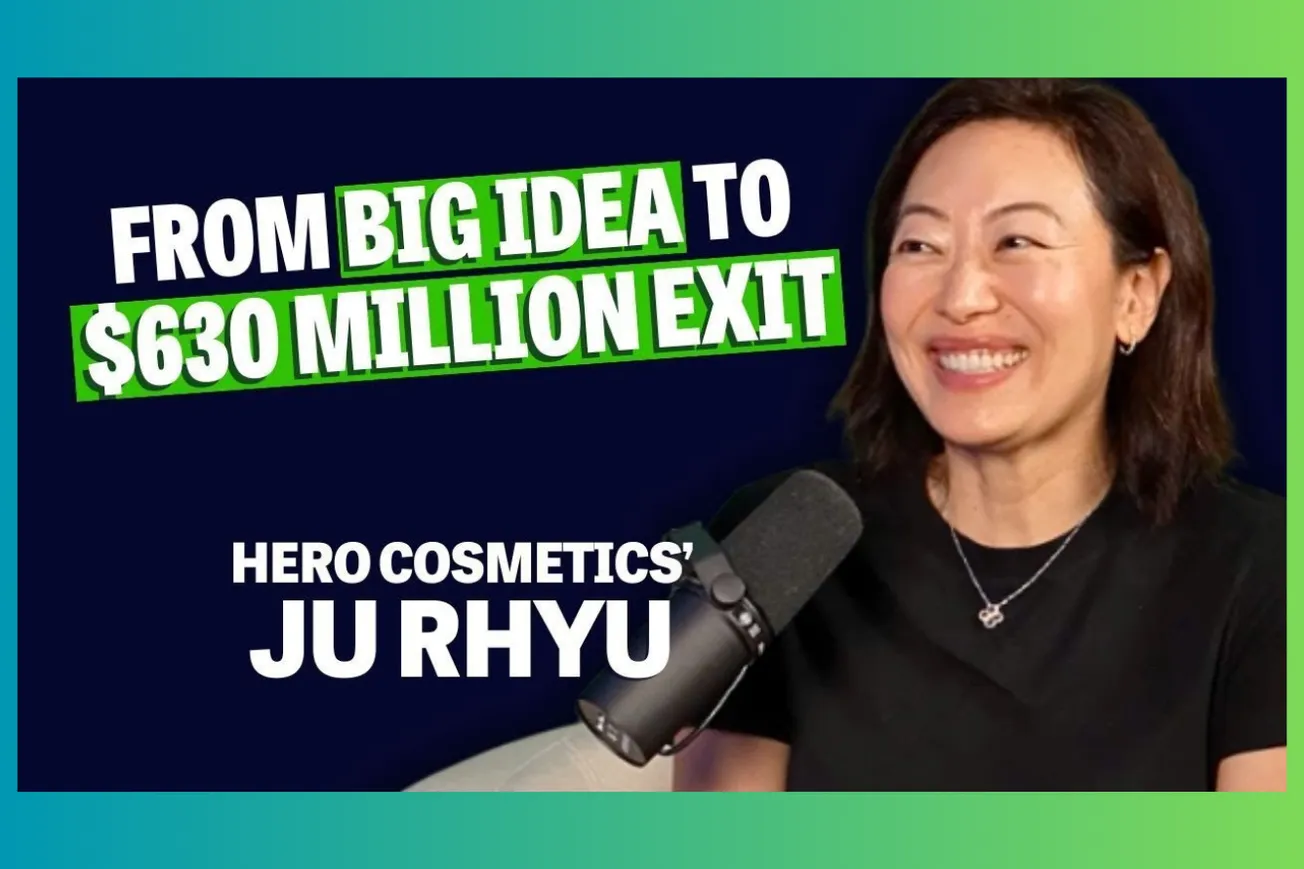Table of Contents
Ju Rhyu's leap from brand marketer to founder of Hero Cosmetics shows how smart risk-taking and white-space innovation can drive massive scale.
Key Takeaways
- Ju Rhyu founded Hero Cosmetics after discovering acne patches in Korea and identifying a U.S. market gap.
- The company launched its first product, the Mighty Patch, on Amazon with just $50,000 in startup capital.
- Early success came from influencer seeding, earned media, and targeting commerce-focused press.
- Hero Cosmetics was profitable from year one and grew rapidly without outside investment for three years.
- Strategic funding later allowed for team expansion and channel diversification, including retail partnerships with Target.
- Ju and her co-founders exited the company in 2022 for $630 million, selling to Church & Dwight.
- Her next act will draw on learned efficiencies: hiring top talent, easier funding access, and stronger retail connections.
From Corporate Comfort to Entrepreneurial Risk
- Ju Rhyu grew up watching her father run a small business, which planted early seeds of entrepreneurial ambition.
- She built a strong foundation in brand management at Kraft and honed her marketing skills at American Express.
- Her experience managing innovation and launching new products at corporate giants gave her operational fluency and commercial instinct.
- While living in Korea, she stumbled upon acne patches and was impressed by how effective and discreet they were.
- As a skincare enthusiast, she was shocked that such a product didn’t exist in the U.S. market at scale.
- The idea stayed with her as she returned to the U.S. and worked at Samsung, where she observed trends in consumer electronics and e-commerce.
- Eventually, she partnered with Andrew Lee and Dwight Lee—friends with complementary expertise in digital strategy, logistics, and design.
From Amazon Launch to Cult Skincare Brand
- The team launched Hero Cosmetics with a single hero product, the Mighty Patch, in 2017.
- They began selling exclusively on Amazon, capitalizing on its demand generation and ease of entry.
- With only $50,000 in startup capital, they focused heavily on cost efficiency and lean operations.
- Rather than blow money on paid ads, they seeded samples to micro-influencers and relied on earned media.
- BuzzFeed, Wirecutter, and other commerce-focused platforms became instrumental in building awareness.
- Customers raved about the product’s minimal design, fast results, and skin-friendly ingredients.
- The brand rapidly gained traction, especially with millennials and Gen Z consumers seeking effective, no-fuss skincare solutions.
- By the end of the first year, they were profitable—a rarity in beauty startups.
Scaling Intelligently: People, Process, Platform
- As the brand grew, Ju faced the challenge of scaling without sacrificing agility.
- Her philosophy shifted from hiring generalists to onboarding domain experts with leadership experience.
- Bringing in seasoned executives helped her step back from daily execution and focus on strategy.
- The team developed robust supply chains, enhanced product development processes, and expanded fulfillment infrastructure.
- COVID-19 temporarily disrupted retail expansion plans, but Hero doubled down on e-commerce and thrived.
- When they raised their first round of institutional capital, it wasn’t for survival—it was to scale on their own terms.
- That funding enabled new product launches, entry into brick-and-mortar retailers, and greater brand storytelling.
- Target became a major growth partner, offering the shelf space and nationwide reach Hero needed.
Exit Strategy: Planning for the Right Moment
- From early on, Ju and her co-founders planned toward a strategic exit.
- They tracked industry multiples and set revenue goals to position themselves as an attractive acquisition target.
- The danger, Ju said, was in waiting too long and becoming “too big to buy” for most CPG acquirers.
- By 2022, they had built a business with $100M+ in revenue and high brand equity, making it an appealing acquisition.
- Church & Dwight, known for buying founder-led brands, acquired Hero Cosmetics for $630 million.
- Post-acquisition, Ju stayed on to help steer the brand’s integration and global expansion.
- The acquisition unlocked Hero’s international potential, taking the brand into 50+ countries.
- Ju learned to balance emotional detachment with strategic stewardship—shifting from owner to visionary guide.
The Next Chapter: What's Ahead for Ju Rhyu
- After the sale, Ju embraced a period of reflection but remains deeply invested in entrepreneurship.
- She actively scans retail environments for untapped categories, looking for gaps that others overlook.
- Her next venture will likely follow the Hero playbook: identify whitespace, test cheaply, scale quickly.
- With a proven track record, Ju now has faster access to capital, a ready-made network, and credibility with top talent.
- She plans to reunite with former colleagues who share her values of agility, integrity, and customer obsession.
- Having learned from early hiring missteps, she now prioritizes culture-fit and accountability.
- She believes the biggest lever in any startup is team quality and spends more time recruiting than fundraising.
- Her core philosophy remains: if you're not clearly different, you're not memorable. Whether through packaging, price point, or tone of voice, every brand must carve a distinct space.
Ju Rhyu didn’t just bring an international skincare trend to America—she built an iconic brand from scratch, scaled profitably, exited strategically, and inspired a generation of indie beauty founders. Her journey proves that with clarity, discipline, and bold thinking, you can build something extraordinary from almost nothing.





